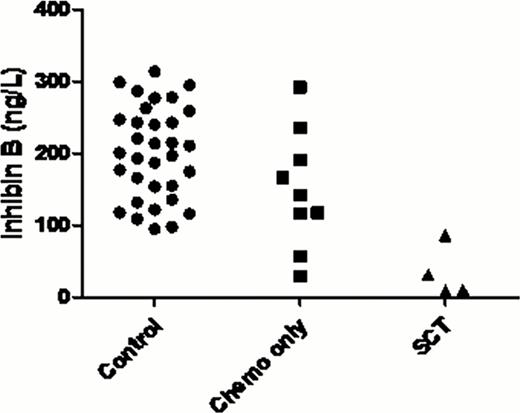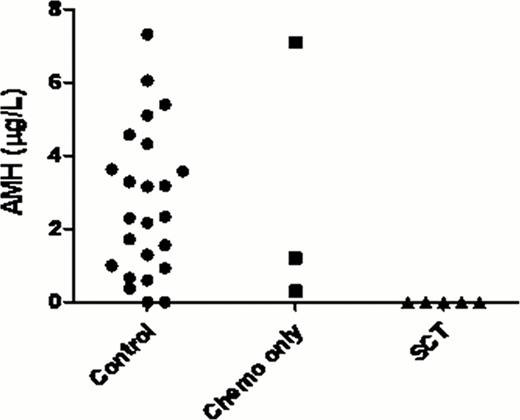Abstract
Abstract 4228
Survival of childhood acute myeloid leukemia (AML) has increased significantly over the past decades. Improved treatment strategies include intensive chemotherapy, by which stem cell transplantation (SCT) has been replaced in most of the current protocols for more than 80% of the cases. Limited data exist on endocrine late effects in AML survivors treated with chemotherapy only. The current study focuses on the effect of chemotherapy only on endocrine function and components of the metabolic syndrome (MetS) in adult survivors of childhood AML.
In this prospective study with a cross-sectionally recruited controlgroup, endocrine function and components of the MetS were assessed in 12 AML survivors (3 females), treated with chemotherapy only, and in 9 survivors of myeloid leukemias treated with SCT, including TBI as conditioning regimen, after a median follow up time of 20 years (range 9–31). Data were compared with those of 60 controls (23 females).
In survivors treated with chemotherapy only no endocrinopathies were observed, although AMH and Inhibin B levels tended to be lower than in controls. In chemo-only survivors, frequency of the components of the MetS was not different from controls. In transplanted AML survivors one subject was growth hormone deficient, five had thyroid dysfunction and all survivors had gonadal dysfunction. SCT survivors had a higher risk for components of the MetS, especially a significantly higher frequency of dyslipidemia than controls (63% vs. 6%, P<0.001).
At twenty years of follow up, survivors of AML treated with chemotherapy only did not show an increased risk at most endocrinopathies and metabolic syndrome as compared to healthy controls, which is in contrast to childhood AML survivors treated with SCT. Gonadal function should however be evaluated with care.
Levels of Inhibin B (ng/L) in controls, chemo-only survivors and SCT survivors.
SCT: stem cell transplantation;
Levels AMH (μg/L) in controls, chemo-only survivors and SCT survivors.
SCT: stem cell transplantation
No relevant conflicts of interest to declare.
Author notes
Asterisk with author names denotes non-ASH members.



